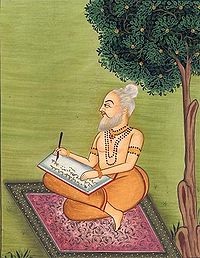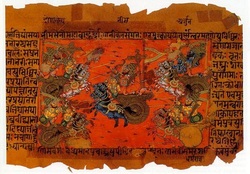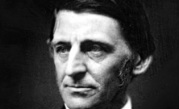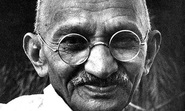Hindu Scripture

What scripture(s) do Hindus follow?
Judaism and Christianity have a scripture or Holy Book. In Judaism it’s the Torah or Tankh (known to Christians as the Old Testament of the Bible) and for Christianity it's primarily the New Testament. The common authoritative religious texts for all Hindus are the Vedas. Veda literally means “knowledge.” It is an immense collection of ancient Sanskrit writings divided into different categories such as the four principal Vedas (Rig, Artha Yajur, and Sama), the Upanishads, the Puranas, and famous texts such as the Bhagavad-Gita and Bhagavat Purana as well as a vast amount of works collectively known as Smriti.
Most of these works cannot be accurately dated by modern historians, who attribute the earlier works to have been recorded somewhere between 2500 and 1000 BCE. These sacred texts were originally handed down through an oral tradition and their integrity was preserved by a very complex system of chanting and memorization. According to the Vedas themselves (and something accepted by many historians), with the onset of the current era some 5000 years ago— known in Vedic terms as Kali Yuga (the iron age of quarrel and confusion)—the great literary incarnation of God known as Vedavyasa undertook the monumental task of committing all Vedic scripture to writing. This was primarily done because people no longer had the discipline and power of memorization they had in previous eras. Because of the original scripture being part of an oral tradition, all of the Vedic scriptures are songs or poetry and are often sung by Hindus around the world on special days.
All of the different schools of thought and religious belief collectively known as Hinduism accept the Vedas in total or in part as the foundation for their beliefs and practices. The Vedas are considered the ultimate authority, and if a teacher of Hinduism were to attempt to create or fabricate teachings that were outside of or contradicted Vedic scripture, then they would be challenged and defeated in argument. So there was no situation where somebody could just create their own “truth.”
Judaism and Christianity have a scripture or Holy Book. In Judaism it’s the Torah or Tankh (known to Christians as the Old Testament of the Bible) and for Christianity it's primarily the New Testament. The common authoritative religious texts for all Hindus are the Vedas. Veda literally means “knowledge.” It is an immense collection of ancient Sanskrit writings divided into different categories such as the four principal Vedas (Rig, Artha Yajur, and Sama), the Upanishads, the Puranas, and famous texts such as the Bhagavad-Gita and Bhagavat Purana as well as a vast amount of works collectively known as Smriti.
Most of these works cannot be accurately dated by modern historians, who attribute the earlier works to have been recorded somewhere between 2500 and 1000 BCE. These sacred texts were originally handed down through an oral tradition and their integrity was preserved by a very complex system of chanting and memorization. According to the Vedas themselves (and something accepted by many historians), with the onset of the current era some 5000 years ago— known in Vedic terms as Kali Yuga (the iron age of quarrel and confusion)—the great literary incarnation of God known as Vedavyasa undertook the monumental task of committing all Vedic scripture to writing. This was primarily done because people no longer had the discipline and power of memorization they had in previous eras. Because of the original scripture being part of an oral tradition, all of the Vedic scriptures are songs or poetry and are often sung by Hindus around the world on special days.
All of the different schools of thought and religious belief collectively known as Hinduism accept the Vedas in total or in part as the foundation for their beliefs and practices. The Vedas are considered the ultimate authority, and if a teacher of Hinduism were to attempt to create or fabricate teachings that were outside of or contradicted Vedic scripture, then they would be challenged and defeated in argument. So there was no situation where somebody could just create their own “truth.”
Bhagavad-Gita

What is the most well known Hindu/Vedic scripture?
Of all the Vedic scriptures, perhaps the most well known is the Bhagavad-Gita, which has been universally loved and praised by many of the world’s greatest minds in modern times.
Albert Einstein: “When I read the Bhagavad-Gita and reflect about how God created this universe, everything else seems so superfluous” and “I have made the Bhagwad-Gita as the main source of my inspiration and guide for the purpose of scientific investigations and formation of my theories.”
Henry David Thoreau: “In the morning I bathe my intellect in the stupendous and cosmogonal philosophy of the Bhagavad-Gita, in comparison with which our modern world and its literature seem puny and trivial.”
Dr. Albert Schweitzer: “The Bhagavad-Gita has a profound influence on the spirit of mankind by its devotion to God which is manifested by actions.”
Herman Hesse: “The marvel of the Bhagavad-Gita is its truly beautiful revelation of life’s wisdom which enables philosophy to blossom into religion.”
Of all the Vedic scriptures, perhaps the most well known is the Bhagavad-Gita, which has been universally loved and praised by many of the world’s greatest minds in modern times.
Albert Einstein: “When I read the Bhagavad-Gita and reflect about how God created this universe, everything else seems so superfluous” and “I have made the Bhagwad-Gita as the main source of my inspiration and guide for the purpose of scientific investigations and formation of my theories.”
Henry David Thoreau: “In the morning I bathe my intellect in the stupendous and cosmogonal philosophy of the Bhagavad-Gita, in comparison with which our modern world and its literature seem puny and trivial.”
Dr. Albert Schweitzer: “The Bhagavad-Gita has a profound influence on the spirit of mankind by its devotion to God which is manifested by actions.”
Herman Hesse: “The marvel of the Bhagavad-Gita is its truly beautiful revelation of life’s wisdom which enables philosophy to blossom into religion.”

Ralph Waldo Emerson: “I owed a magnificent day to the Bhagavad-Gita. It was the first of books; it was as if an empire spoke to us, nothing small or unworthy, but large, serene, consistent, the voice of an old intelligence which in another age and climate had pondered and thus disposed of the same questions which exercise us.”
Aldous Huxley: “The Bhagavad-Gita is the most systematic statement of spiritual evolution of endowing value to mankind. It is one of the most clear and comprehensive summaries of perennial philosophy ever revealed; hence its enduring value is subject not only to India but to all of humanity.”
Aldous Huxley: “The Bhagavad-Gita is the most systematic statement of spiritual evolution of endowing value to mankind. It is one of the most clear and comprehensive summaries of perennial philosophy ever revealed; hence its enduring value is subject not only to India but to all of humanity.”

Mahatma Gandhi: “When doubts haunt me, when disappointments stare me in the face, and I see not one ray of hope on the horizon, I turn to Bhagavad-Gita and find a verse to comfort me; and I immediately begin to smile in the midst of overwhelming sorrow. Those who meditate on the Gita will derive fresh joy and new meanings from it every day.”
Dr. Paul Lesourd, (Author Professeur Honoraire, Catholic University of Paris) “I can say that in the Bhagavad-gita As It Is I have found explanations and answers to questions I had always posed regarding the interpretations of this sacred work, whose spiritual discipline I greatly admire. If the asceticism and ideal of the apostles which form the message of the Bhagavad-Gita As It Is were more widespread and more respected, the world in which we live would be transformed into a better, more fraternal place”
Dr. Paul Lesourd, (Author Professeur Honoraire, Catholic University of Paris) “I can say that in the Bhagavad-gita As It Is I have found explanations and answers to questions I had always posed regarding the interpretations of this sacred work, whose spiritual discipline I greatly admire. If the asceticism and ideal of the apostles which form the message of the Bhagavad-Gita As It Is were more widespread and more respected, the world in which we live would be transformed into a better, more fraternal place”